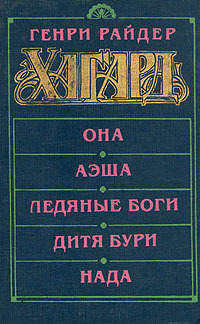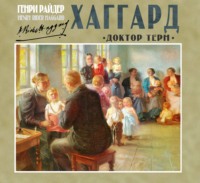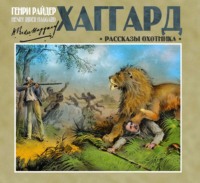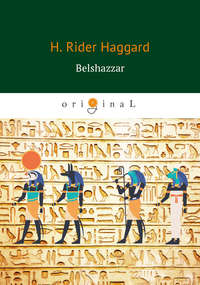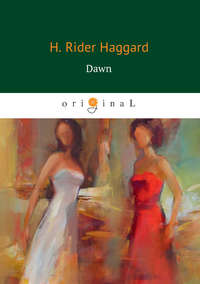
Полная версия
Ayesha: The Return of She
After this we asked leave to retire to our chamber in order to rest, and there, upon very good imitations of beds, we slept solidly for four and twenty hours, rising at last perfectly refreshed and well.
Such was our introduction to the Monastery of the Mountains – for it had no other name – where we were destined to spend the next six months of our lives. Within a few days – for they were not long in giving us their complete confidence – those good-hearted and simple old monks told us all their history.
It seemed that of old time there was a Lamasery here, in which dwelt several hundred brethren. This, indeed, was obviously true, for the place was enormous, although for the most part ruined, and, as the weather-worn statue of Buddha showed, very ancient. The story ran, according to the old abbot, that two centuries or so before, the monks had been killed out by some fierce tribe who lived beyond the desert and across the distant mountains, which tribe were heretics and worshippers of fire. Only a few of them escaped to bring the sad news to other communities, and for five generations no attempt was made to reoccupy the place.
At length it was revealed to him, our friend Kou-en, when a young man, that he was a re-incarnation of one of the old monks of this monastery, who also was named Kou-en, and that it was his duty during his present life to return thither, as by so doing he would win much merit and receive many wonderful revelations. So he gathered a band of zealots and, with the blessing and consent of his superiors, they started out, and after many hardships and losses found and took possession of the place, repairing it sufficiently for their needs.
This happened about fifty years before, and here they had dwelt ever since, only communicating occasionally with the outside world. At first their numbers were recruited from time to time by new brethren, but at length these ceased to come, with the result that the community was dying out.
“And what then?” I asked.
“And then,” the abbot answered, “nothing. We have acquired much merit; we have been blest with many revelations, and, after the repose we have earned in Devachan, our lots in future existences will be easier. What more can we ask or desire, removed as we are from all the temptations of the world?”
For the rest, in the intervals of their endless prayers, and still more endless contemplations, they were husbandmen, cultivating the soil, which was fertile at the foot of the mountain, and tending their herd of yaks. Thus they wore away their blameless lives until at last they died of old age, and, as they believed – and who shall say that they were wrong – the eternal round repeated itself elsewhere.
Immediately after, indeed on the very day of our arrival at the monastery the winter began in earnest with bitter cold and snowstorms so heavy and frequent that all the desert was covered deep. Very soon it became obvious to us that here we must stay until the spring, since to attempt to move in any direction would be to perish. With some misgivings we explained this to the abbot Kou-en, offering to remove to one of the empty rooms in the ruined part of the building, supporting ourselves with fish that we could catch by cutting a hole in the ice of the lake above the monastery, and if we were able to find any, on game, which we might trap or shoot in the scrub-like forest of stunted pines and junipers that grew around its border. But he would listen to no such thing. We had been sent to be their guests, he said, and their guests we should remain for so long as might be convenient to us. Would we lay upon them the burden of the sin of inhospitality? Besides, he remarked with his chuckle —
“We who dwell alone like to hear about that other great monastery called the World, where the monks are not so favoured as we who are set in this blessed situation, and where folk even go hungry in body, and,” he added, “in soul.”
Indeed, as we soon found out, the dear old man’s object was to keep our feet in the Path until we reached the goal of Truth, or, in other words, became excellent Lamas like himself and his flock.
So we walked in the Path, as we had done in many another Lamasery, and assisted at the long prayers in the ruined temple and studied the Kandjur, or “Translation of the Words” of Buddha, which is their bible and a very long one, and generally showed that our “minds were open.” Also we expounded to them the doctrines of our own faith, and greatly delighted were they to find so many points of similarity between it and theirs. Indeed, I am not certain but that if we could have stopped there long enough, say ten years, we might have persuaded some of them to accept a new revelation of which we were the prophets. Further, in spare hours we told them many tales of “the Monastery called the World,” and it was really delightful, and in a sense piteous, to see the joy with which they listened to these stories of wondrous countries and new races of men; they who knew only of Russia and China and some semi-savage tribes, inhabitants of the mountains and the deserts.
“It is right for us to learn all this,” they declared, “for, who knows, perhaps in future incarnations we may become inhabitants of these places.”
But though the time passed thus in comfort and indeed, compared to many of our experiences, in luxury, oh! our hearts were hungry, for in them burned the consuming fire of our quest. We felt that we were on the threshold – yes, we knew it, we knew it, and yet our wretched physical limitations made it impossible for us to advance by a single step. On the desert beneath fell the snow, moreover great winds arose suddenly that drove those snows like dust, piling them in heaps as high as trees, beneath which any unfortunate traveller would be buried. Here we must wait, there was nothing else to be done.
One alleviation we found, and only one. In a ruined room of the monastery was a library of many volumes, placed there, doubtless, by the monks who were massacred in times bygone. These had been more or less cared for and rearranged by their successors, who gave us liberty to examine them as often as we pleased. Truly it was a strange collection, and I should imagine of priceless value, for among them were to be found Buddhistic, Sivaistic and Shamanistic writings that we had never before seen or heard of, together with the lives of a multitude of Bodhisatvas, or distinguished saints, written in various tongues, some of which we did not understand.
What proved more interesting to us, however, was a diary in many tomes that for generations had been kept by the Khubilghans or abbots of the old Lamasery, in which every event of importance was recorded in great detail. Turning over the pages of one of the last volumes of this diary, written apparently about two hundred and fifty years earlier, and shortly before the destruction of the monastery, we came upon an entry of which the following – for I can only quote from memory – is the substance —
“In the summer of this year, after a very great sandstorm, a brother (the name was given, but I forget it) found in the desert a man of the people who dwell beyond the Far Mountains, of whom rumours have reached this Lamasery from time to time. He was living, but beside him were the bodies of two of his companions who had been overwhelmed by sand and thirst. He was very fierce looking. He refused to say how he came into the desert, telling us only that he had followed the road known to the ancients before communication between his people and the outer world ceased. We gathered, however, that his brethren with whom he fled had committed some crime for which they had been condemned to die, and that he had accompanied them in their flight. He told us that there was a fine country beyond the mountains, fertile, but plagued with droughts and earthquakes, which latter, indeed, we often feel here.
“The people of that country were, he said, warlike and very numerous but followed agriculture. They had always lived there, though ruled by Khans who were descendants of the Greek king called Alexander, who conquered much country to the south-west of us. This may be true, as our records tell us that about two thousand years ago an army sent by that invader penetrated to these parts, though of his being with them nothing is said.
“The stranger-man told us also that his people worship a priestess called Hes or the Hesea, who is said to reign from generation to generation. She lives in a great mountain, apart, and is feared and adored by all, but is not the queen of the country, in the government of which she seldom interferes. To her, however, sacrifices are offered, and he who incurs her vengeance dies, so that even the chiefs of that land are afraid of her. Still their subjects often fight, for they hate each other.
“We answered that he lied when he said that this woman was immortal – for that was what we supposed he meant – since nothing is immortal; also we laughed at his tale of her power. This made the man very angry. Indeed he declared that our Buddha was not so strong as this priestess, and that she would show it by being avenged upon us.
“After this we gave him food and turned him out of the Lamasery, and he went, saying that when he returned we should learn who spoke the truth. We do not know what became of him, and he refused to reveal to us the road to his country, which lies beyond the desert and the Far Mountains. We think that perhaps he was an evil spirit sent to frighten us, in which he did not succeed.”
Such is a precis of this strange entry, the discovery of which, vague as it was, thrilled us with hope and excitement. Nothing more appeared about the man or his country, but within a little over a year from that date the diary of the abbot came to a sudden end without any indication that unusual events had occured or were expected.
Indeed, the last item written in the parchment book mentioned the preparation of certain new lands to be used for the sowing of grain in future seasons, which suggested that the brethren neither feared nor expected disturbance. We wondered whether the man from beyond the mountains was as good as his word and had brought down the vengeance of that priestess called the Hesea upon the community which sheltered him. Also we wondered – ah! how we wondered – who and what this Hesea might be.
On the day following this discovery we prayed the abbot, Kou-en, to accompany us to the library, and having read him the passage, asked if he knew anything of the matter. He swayed his wise old head, which always reminded me of that of a tortoise, and answered —
“A little. Very little, and that mostly about the army of the Greek king who is mentioned in the writing.”
We inquired what he could possibly know of this matter, whereon Kou-en replied calmly —
“In those days when the faith of the Holy One was still young, I dwelt as a humble brother in this very monastery, which was one of the first built, and I saw the army pass, that is all. That,” he added meditatively, “was in my fiftieth incarnation of this present Round – no, I am thinking of another army – in my seventy-third.”[*]
[*] As students of their lives and literature will be aware, it is common for Buddhist priests to state positively that they remember events which occurred during their previous incarnations. – ed.
Here Leo began a great laugh, but I managed to kick him beneath the table and he turned it into a sneeze. This was fortunate, as such ribald merriment would have hurt the old man’s feelings terribly. After all, also, as Leo himself had once said, surely we were not the people to mock at the theory of re-incarnation, which, by the way, is the first article of faith among nearly one quarter of the human race, and this not the most foolish quarter.
“How can that be – I ask for instruction, learned One – seeing that memory perishes with death?”
“Ah!” he answered, “Brother Holly, it may seem to do so, but oftentimes it comes back again, especially to those who are far advanced upon the Path. For instance, until you read this passage I had forgotten all about that army, but now I see it passing, passing, and myself with other monks standing by the statue of the big Buddha in front yonder, and watching it go by. It was not a very large army, for most of the soldiers had died, or been killed, and it was being pursued by the wild people who lived south of us in those days, so that it was in a great hurry to put the desert between it and them. The general of the army was a swarthy man – I wish that I could remember his name, but I cannot.
“Well,” he went on, “that general came up to the Lamasery and demanded a sleeping place for his wife and children, also provisions and medicines, and guides across the desert. The abbot of that day told him it was against our law to admit a woman under our roof, to which he answered that if we did not, we should have no roof left, for he would burn the place and kill every one of us with the sword. Now, as you know, to be killed by violence means that we must pass sundry incarnations in the forms of animals, a horrible thing, so we chose the lesser evil and gave way, and afterwards obtained absolution for our sins from the Great Lama. Myself I did not see this queen, but I saw the priestess of their worship – alas! alas!” and Kou-en beat his breast.
“Why alas?” I asked, as unconcernedly as I could, for this story interested me strangely.
“Why? Oh! because I may have forgotten the army, but I have never forgotten that priestess, and she has been a great hindrance to me through many ages, delaying me upon my journey to the Other Side, to the Shore of Salvation. I, as a humble Lama, was engaged in preparing her apartment when she entered and threw aside her veil; yes, and perceiving a young man, spoke to me, asking many questions, and even if I was not glad to look again upon a woman.”
“What – what was she like?” said Leo, anxiously.
“What was she like? Oh! She was all loveliness in one shape; she was like the dawn upon the snows; she was like the evening star above the mountains; she was like the first flower of the spring. Brother, ask me not what she was like, nay, I will say no more. Oh! my sin, my sin. I am slipping backward and you draw my black shame out into the light of day. Nay, I will confess it that you may know how vile a thing I am – I whom perhaps you have thought holy – like yourselves. That woman, if woman she were, lit a fire in my heart which will not burn out, oh! and more, more,” and Kou-en rocked himself to and fro upon his stool while tears of contrition trickled from beneath his horn spectacles, “she made me worship her! For first she asked me of my faith and listened eagerly as I expounded it, hoping that the light would come into her heart; then, after I had finished she said —
“‘So your Path is Renunciation and your Nirvana a most excellent Nothingness which some would think it scarce worth while to strive so hard to reach. Now I will show you a more joyous way and a goddess more worthy of your worship.’
“‘What way, and what goddess?’ I asked of her.
“‘The way of Love and Life!” she answered, ‘that makes all the world to be, that made you, O seeker of Nirvana, and the goddess called Nature!’
“Again I asked where is that goddess, and behold! she drew herself up, looking most royal, and touching her ivory breast, she said, ‘I am She. Now kneel you down and do me homage!’
“My brethren, I knelt, yes, I kissed her foot, and then I fled away shamed and broken-hearted, and as I went she laughed, and cried: ‘Remember me when you reach Devachan, O servant of the Budda-saint, for though I change, I do not die, and even there I shall be with you who once gave me worship!’
“And it is so, my brethren, it is so; for though I obtained absolution for my sin and have suffered much for it through this, my next incarnation, yet I cannot be rid of her, and for me the Utter Peace is far, far away,” and Kouen placed his withered hands before his face and sobbed outright.
A ridiculous sight, truly, to see a holy Khublighan well on the wrong side of eighty, weeping like a child over a dream of a beautiful woman which he imagined he had once dreamt in his last life more than two thousand years ago. So the reader will say. But I, Holly, for reasons of my own, felt deep sympathy with that poor old man, and Leo was also sympathetic. We patted him on the back; we assured him that he was the victim of some evil hallucination which could never be brought up against him in this or any future existence, since, if sin there were, it must have been forgiven long ago, and so forth. When his calm was somewhat restored we tried also to extract further information from him, but with poor results, so far as the priestess was concerned.
He said that he did not know to what religion she belonged, and did not care, but thought that it must be an evil one. She went away the next morning with the army, and he never saw or heard of her any more, though it came into his mind that he was obliged to be locked in his cell for eight days to prevent himself from following her. Yes, he had heard one thing, for the abbot of that day had told the brethren. This priestess was the real general of the army, not the king or the queen, the latter of whom hated her. It was by her will that they pushed on northwards across the desert to some country beyond the mountains, where she desired to establish herself and her worship.
We asked if there really was any country beyond the mountains, and Kou-en answered wearily that he believed so. Either in this or in a previous life he had heard that people lived there who worshipped fire. Certainly also it was true that about thirty years ago a brother who had climbed the great peak yonder to spend some days in solitary meditation, returned and reported that he had seen a marvellous thing, namely, a shaft of fire burning in the heavens beyond those same mountains, though whether this were a vision, or what, he could not say. He recalled, however, that about that time they had felt a great earthquake.
Then the memory of that fancied transgression again began to afflict Kouen’s innocent old heart, and he crept away lamenting and was seen no more for a week. Nor would he ever speak again to us of this matter.
But we spoke of it much with hope and wonder, and made up our minds that we would at once ascend this mountain.
Chapter 3
The Beacon Light
A week later came our opportunity of making this ascent of the mountain, for now in mid-winter it ceased storming, and hard frost set in, which made it possible to walk upon the surface of the snow. Learning from the monks that at this season ovis poli and other kinds of big-horned sheep and game descended from the hills to take refuge in certain valleys, where they scraped away the snow to find food, we announced that we were going out to hunt. The excuse we gave was that we were suffering from confinement and needed exercise, having by the teaching of our religion no scruples about killing game.
Our hosts replied that the adventure was dangerous, as the weather might change at any moment. They told us, however, that on the slopes of this very mountain which we desired to climb, there was a large natural cave where, if need be, we could take shelter, and to this cave one of them, somewhat younger and more active than the rest, offered to guide us. So, having manufactured a rougri tent from skins, and laden our old yak, now in the best of condition, with food and garments, on one still morning we started as soon as it was light. Under the guidance of the monk, who, notwithstanding his years, walked very well, we reached the northern slope of the peak before mid-day. Here, as he had said, we found a great cave of which the opening was protected by an over-hanging ledge of rock. Evidently this cave was the favourite place of shelter for game at certain seasons of the year, since in it were heaped vast accumulations of their droppings, which removed any fear of a lack of fuel.
The rest of that short day we spent in setting up our tent in the cave, in front of which we lit a large fire, and in a survey of the slopes of the mountain, for we told the monk that we were searching for the tracks of wild sheep. Indeed, as it happened, on our way back to the cave we came across a small herd of ewes feeding upon the mosses in a sheltered spot where in summer a streamlet ran. Of these we were so fortunate as to kill two, for no sportsman had ever come here, and they were tame enough, poor things. As meat would keep for ever in that temperature, we had now sufficient food to last us for a fortnight, and dragging the animals down the snow slopes to the cave, we skinned them by the dying light.
That evening we supped upon fresh mutton, a great luxury, which the monk enjoyed as much as we did, since, whatever might be his views as to taking life, he liked mutton. Then we turned into the tent and huddled ourselves together for warmth, as the temperature must have been some degrees below zero. The old monk rested well enough, but neither Leo nor I slept over much, for wonder as to what we might see from the top of that mountain banished sleep.
Next morning at the dawn, the weather being still favourable, our companion returned to the monastery, whither we said we would follow him in a day or two.
Now at last we were alone, and without wasting an instant began our ascent of the peak. It was many thousand feet high and in certain places steep enough, but the deep, frozen snow made climbing easy, so that by midday we reached the top. Hence the view was magnificent. Beneath us stretched the desert, and beyond it a broad belt of fantastically shaped, snow-clad mountains, hundreds and hundreds of them; in front, to the right, to the left, as far as the eye could reach.
“They are just as I saw them in my dream so many years ago,” muttered Leo; “the same, the very same.”
“And where was the fiery light?” I asked.
“Yonder, I think;” and he pointed north by east.
“Well, it is not there now,” I answered, “and this place is cold.”
So, since it was dangerous to linger, lest the darkness should overtake us on our return journey, we descended the peak again, reaching the cave about sunset. The next four days we spent in the same way. Every morning we crawled up those wearisome banks of snow, and every afternoon we slid and tobogganed down them again, till I grew heartily tired of the exercise.
On the fourth night, instead of coming to sleep in the tent Leo sat himself down at the entrance to the cave. I asked him why he did this, but he answered impatiently, because he wished it, so I left him alone. I could see, indeed, that he was in a strange and irritable mood, for the failure of our search oppressed him. Moreover, we knew, both of us, that it could not be much prolonged, since the weather might break at any moment, when ascents of the mountain would become impossible.
In the middle of the night I was awakened by Leo shaking me and saying —
“Come here, Horace, I have something to show you.”
Reluctantly enough I crept from between the rugs and out of the tent. To dress there was no need, for we slept in all our garments. He led me to the mouth of the cave and pointed northward. I looked. The night was very dark; but far, far away appeared a faint patch of light upon the sky, such as might be caused by the reflection of a distant fire.
“What do you make of it?” he asked anxiously.
“Nothing in particular,” I answered, “it may be anything. The moon – no, there is none, dawn – no, it is too northerly, and it does not break for three hours. Something burning, a house, or a funeral pyre, but how can there be such things here? I give it up.”
“I think it is a reflection, and that if we were on the peak we should see the light which throws it,” said Leo slowly.
“Yes, but we are not, and cannot get there in the dark.”
“Then, Horace, we must spend a night there.”
“It will be our last in this incarnation,” I answered with a laugh, “that is if it comes on to snow.”
“We must risk it, or I will risk it. Look, the light has faded;” and there at least he was right, for undoubtedly it had. The night was as black as pitch.
“Let’s talk it over to-morrow,” I said, and went back to the tent, for I was sleepy and incredulous, but Leo sat on by the mouth of the cave.
At dawn I awoke and found breakfast already cooked.
“I must start early,” Leo explained.



